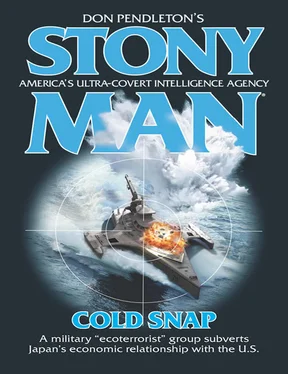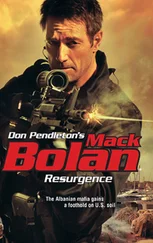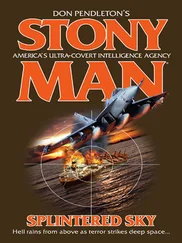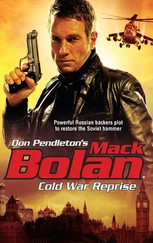It couldn’t have been easy, but the Texan closed his eyes and was immediately off to slumber.
If he couldn’t keep his mind active, Manning knew he’d store energy, rest and prepare himself. They’d already been an hour on the plane and T.J. had read up on as much Japanese culture as he could endure, had enough refreshers on common Japanese phrases and been in on plenty of briefing on foreign intelligence services at work in Tokyo, their current destination.
Manning and Hawkins were “stuck” with the job of being boots on the ground in Japan for the certitude that there would be elements of the anti-Japanese conspiracy active in that country. Manning’s business knowledge would give the two of them a head start on looking for angles and leads.
Would it be good enough?
Manning dismissed that thought. It had been enough before. Stony Man worked simply because the covert agency, despite its incredibly small size, utilized every asset it could assemble.
Thinking outside the box, while being intimately aware of the makeup of said container, was one way in which the teams could intercede and defeat threatening forces.
So far, it had worked.
Manning didn’t intend to fail for lack of effort.
* * *
BARBARA PRICE WAS glad that Phoenix Force was off and away, and before the day was over, one half would be in the Ross Sea, seeking out the lethal marauders. Manning and Hawkins were on their way to Japan to seek out potential suspects working within the country. Able Team, at home, was on the hunt for those who’d staged a massacre mere hundreds of yards from the President and a contingent of diplomats.
As it was, the international scene and local press were talking about the White House crisis and how Japanese “big business” had the nerve to murder honest Americans in the middle of its capital city. That point of view was coming from the left, looking for a “good war,” while the right buckled down on how the U.S. administration was antibusiness and was using the crisis for the sake of painting “job makers” as the criminals.
Price wrinkled her nose. Once upon a time, there was such a thing as a news cycle, where events were reported and later analyzed to find meaning. But now, in the parade of propaganda, the truth was lost. American was pitted against American, leading the more paranoid of commentators to foresee a civil war. Such a fomentation of hostility, where one wing of philosophy saw the other as utterly evil, despite evidence of the truth, was an abomination that Stony Man sought to battle. Far too many times the teams had seen an attempt to manipulate public opinion to the point of fracturing societies, to inspire wars between nations. Such trickery was so commonplace, Price had developed an armor against leaping to unfounded accusations. She didn’t develop an opinion without conclusive facts.
The Stony Man intel would never be allowed into a court of law, but their evidence was always succinct and conclusive to the point that when they took action against the guilty, there would be no mistakes. Every time Able Team and Phoenix Force went into action, they battled with clear consciences. Their foes were not scapegoats, but those who actually acted to harm innocent noncombatants or the madmen who sought to secure profit and power from acts of terror and mayhem.
Then again, Price knew that her job wasn’t to sell commercial time to fatten the pockets of media moguls. Her job was to help protect America, her allies, the whole of the world at times. She and the cybernetics crew looked at raw data and events. They could tell that poverty and orphanhood were factors that gave violent gangs and terrorist groups thousands of recruits yearly for their personal shock troopers. Hamas soldiers didn’t stem from Israeli occupation, but from the poverty caused by the strife in the region. Poor and homeless, often growing up without fathers or mothers or both, these young people were ripe for transforming from “victims” into “avengers.”
Smart, devious bastards located a bumper crop of foot soldiers to twist to their cause, and they swooped in, forming modern-day groups such as the Ku Klux Klan, the Bloods, the Islamic Jihad. Give a man without life a target for his anger, a reason for his failures, and you could fill an army’s ranks. Trailer parks. Occupied slums. Inner cities ruled by drug lords. Nations deprived of education.
Because of this continuum of ignorance, of fanned prejudices and hatreds, Stony Man was perpetually at war.
There were billions of humans on the planet and hundreds of potential holes from which the greedy, the sociopathic and the murderous could draw upon. Finding dupes, already led astray by fake news and overhyped political commentary, turned the world into a factory for fanatics and maniacs.
Price sometimes wished that she could arrange for the cyber crew to crash some of these news stations, bankrupting them and obliterating their influence upon the American public. Liars of left and right persuasions would suddenly have nothing else to work with. Unfortunately such an act would be the ultimate in government censorship.
While the alarmists bellowed “Fire” in a crowded theater, pushing people to trample their neighbors in panic all for a profit, Price would not violate the Constitution in that manner. Freedom of speech also applied to blind stupidity, bigotry and prejudice, as well as lies.
“So we save the world from itself, one brushfire at a time,” Price muttered.
“Feeling disgusted by the news coverage?” Kurtzman asked. The wheelchair-bound genius had rolled past her to a coffeepot to refill his mug with a splash of the black, oily, high-octane gruel they jokingly referred to as coffee. It tasted terrible, but it packed the punch of a rocket launcher, enabling the cyber team to withstand hours of hacking and data research.
Price glowered.
“I know. I know. It’s not news,” Kurtzman amended. “But not everyone has access to raw data like we do.”
“No,” Price answered. “But that’s still not an excuse for willful deception of millions of viewers.”
Kurtzman shook his head, agreeing with her with a simple frown. Thickly bearded and with arms and a chest of solid muscle, the leader of the cyber team had earned the nickname “Bear” long before he’d taken a bullet to the spine. Price was reminded of the tales of Native Americans, granting bears great, nearly mystical wisdom, as well as patience. Kurtzman had a calming effect on her. “Unless we catch these people actively destroying Americans, we can’t go after them. But when they do, we’ll drop on them like a ton of bricks.”
Price took a deep breath. She poured herself a mug of the crap they called coffee. She’d need the energy, despite the fact that she had a thermos of homemade java, creamed and sweetened to her particular biases. “Sometimes, though, you have to wonder if these crazed morons aren’t just deliberately shoveling fuel onto the fire.”
“I know how you feel,” Kurtzman told her. “That’s why I always cast an eye toward that avenue. One day, we’ll strike gold.”
Price narrowed her eyes. “I’ll settle for last blood.”
CHAPTER FOUR
Rosario Blancanales drove the Able Team van, a mobile headquarters for the team that also served as armory, electronics locker, communications nerve center and occasionally the biggest hunk of cover that they could find. The van, on the outside, resembled any other generic professional van, complete with the stylish logo of an official-sounding company. Dark brown, with gold-colored lettering, the delivery vehicle was invisible and unnoticeable in residential and professional neighborhoods. The official term—aluminum walk-in van—had become so much a part of the public consciousness that the vehicles, for all intents and purposes, were ignored, unless rolling up for a specific delivery.
Читать дальше












